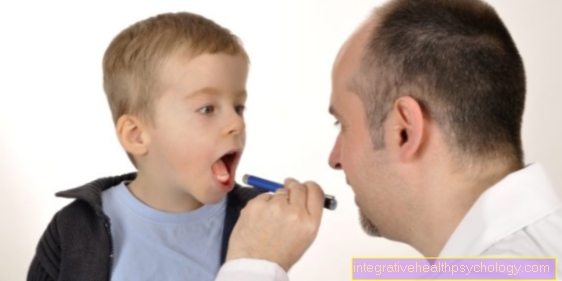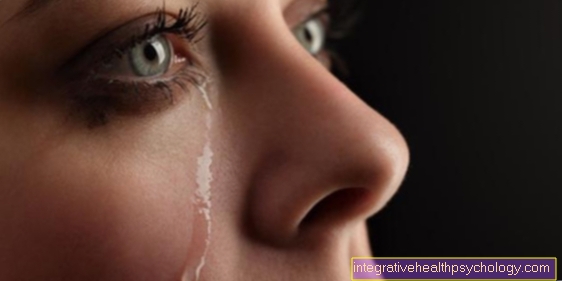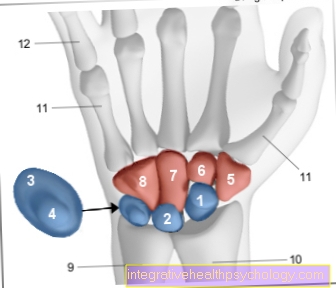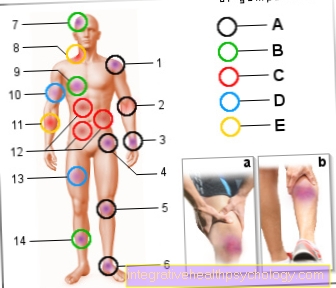Age-related hearing loss
Definition - What is age-related hearing loss?
Aging hearing loss is understood to be a naturally decreasing hearing ability in old age. It begins with a barely noticeable hearing loss around the age of fifty and gradually deteriorates over time.
At the beginning, those affected notice this mainly in an increasing inability to clearly perceive high notes and that background noises can no longer be filtered out of a conversation as well. As a rule, both ears are equally severely affected by the change.
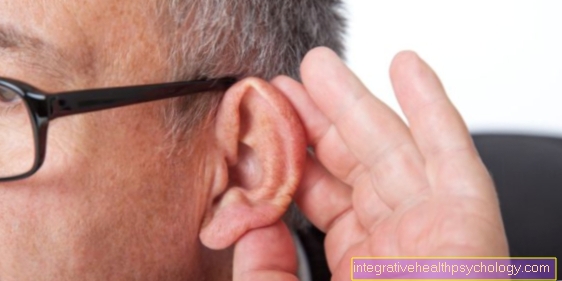
causes
The most important cause of old age hearing loss is already in its name. It is namely the advancing age that leads to a decreased hearing ability.
The hair cells in the inner ear, which are responsible for the perception of tones and noises, wear out naturally. With every audible tone, they are deflected to different degrees in one direction, depending on volume and pitch. Over time, their flexibility and strength decrease, just like other parts of the body. Age-related changes in the skeleton, such as those associated with osteoarthritis, are comparable to age-related hearing loss. In the case of hair cells, very high tones in the high-frequency range in particular require a strong deflection of the hair cells. It is therefore logical that this tone area is the first to be affected.
In addition to the hair cells, age-related changes in the brain also have an impact on old-age hearing loss. The flexibility in thought processes and the processing of new stimuli decreases with decreasing brain matter in old age. That doesn't mean older people get dumber. Rather, it means that they can no longer adjust to current stimuli so well. Tones and noises are acoustic stimuli and are therefore also affected by the changed processing.
Environmental factors such as increased noise exposure in the course of life can lead to an earlier onset of senile hearing loss. Conversely, however, noise-related hearing loss cannot be equated with age-related hearing loss. Drugs such as specific antibiotics or infections are rarely the cause of significant hearing loss in old age. Although they can also damage the hair cells, they usually do not trigger typical senile hearing loss.
diagnosis
The diagnosis of old age hearing loss is made by an ENT doctor. He can carry out various tests for this. The choice of hearing test depends on the patient's cooperation and skills.
As a standard, audiometry is usually carried out, which shows the hearing area of the person affected in a diagram compared to normal healthy people. To carry out the test, the person concerned has to put on headphones and press a button when he hears a sound in one ear. A clear deviation in the high-frequency range suggests age-related hearing loss.
Read also: Hearing test
Audigram
An audiogram is a graphical representation of subjective hearing. The horizontal axis represents the frequency range in Hertz and the vertical axis the sound pressure level in decibels. The entered data is obtained from the previously performed hearing test with the test person and results in the so-called "hearing curve". An audiogram of a normally healthy person is like a horizontal line around zero decibels.
In the case of age-related hearing loss, the curve drops significantly by around forty decibels from around one thousand hertz until it reaches a plateau again in the frequency range around four to eight thousand hertz.
Concomitant symptoms
Accompanying symptoms of age-related hearing loss can be of various kinds. An indication can be an incipient inability to separate different sound sources from one another and to concentrate on the desired sound.
In technical language, this is described as a cocktail party effect. He also describes a specific situation in which this phenomenon can be observed. If someone is at a cocktail party, there are usually many people in one room and the atmosphere is very noisy. A person with normal hearing can concentrate well on his conversation with the other person in such a background noise and can quasi “suppress” the background noise. Someone with old age hearing loss cannot do this and perceives the background noises to be just as loud as the conversation with the other person. If those affected observe this phenomenon in themselves, a hearing test can provide certainty.
In addition to this changed hearing perception, it is most likely a decline in cognitive performance that can be observed. However, it does not necessarily have to be accompanied by a deteriorating hearing ability. Rather, it should be viewed in such a way that the onset of an aging process does not only start in a specific part of the body or organ. Rather, it affects the whole body.In addition to the onset of age-related hearing loss, it is not uncommon for people to observe deteriorating eyesight or skeletal changes.
Read also: Presbyopia
Which frequencies are affected?
Frequencies in the ascending range from one thousand Hertz are particularly affected. Experts speak of the high frequency range here. However, it must be taken into account that the hearing perception is not only dependent on the frequency, but also on the sound pressure level. The hearing perception in the interplay of decibels and hertz must therefore always be considered in relation to one another.
What treatment options are there?
Age-related hearing loss only needs to be treated if it affects the person affected and if he or she wants therapy. The simplest treatment option is the use of hearing aids. These can be selected from a hearing aid acoustician of choice. It is important to find an individually fitting model that is very comfortable to wear. This is the only way to guarantee that those affected will wear them regularly. Depending on your preference, the hearing aid can either be worn behind the ear or in the ear. The specialist will provide detailed testing and clarification on the handling of the devices.
An operation is conceivable to improve an inner ear hearing loss such as senile hearing loss, however, in the special case of senile hearing loss, surgical intervention is not recommended. It is a progressive degeneration process that affects not only the inner ear, but also in many cases the auditory nerve. However, to be successful with the surgery, the auditory nerve must be intact. If this is impaired in its function, an implant inserted in the inner ear (a so-called cochlear implant) cannot bring about any improvement.
Therefore, a significant increase in quality of life in the form of undisturbed communication can only be achieved with hearing aids. They are also much less risky to use than an operation and can also be removed, reinserted or adjusted as required.
Read about it: Types of hearing aids
When do I need a hearing aid?
It depends entirely on subjective well-being when it makes sense to use a hearing aid. If conversations can only be more difficult or if everyday life is strongly influenced by the deteriorating hearing ability, it is advisable to use a hearing aid at least on a trial basis. During this trial period, the person affected can then decide for themselves whether the hearing aids will improve them or not.
Those affected usually notice the appropriate time later than the people around them. Often it is family members or close people who find the hearing impairment to be disruptive in communication. So if people in their environment address this problem, those affected should not react with false pride or be offended. Rather, they should take it as good advice. Because the sooner you start using a hearing aid, the easier it is to use the new device and the easier it is to adjust it if your hearing ability deteriorates. Anyone who is unsure whether their hearing is deteriorating can also have a non-binding hearing test carried out by an ENT doctor or a specialist hearing aid shop. The test result is only a recommendation for further action and is not an obligation.
homeopathy
The use of homeopathic remedies can neither cure nor significantly stop old-age hearing loss. However, since the balance of electrolytes in the inner ear plays a major role, the targeted intake of potassium chloratum globules can possibly bring an improvement. They also add minerals to the body in the form of potassium chloride, which can have a beneficial effect on the hair cells. However, this has not been scientifically proven.
course
The course of age-related hearing loss can vary from person to person. In the majority of cases, however, a typical course of the disease can be determined. It usually begins around the age of fifty and manifests itself in a decreasing ability to perceive high frequencies. Those affected notice this in a waning perception of high notes. Women's and children's voices can often be understood less and less. Over time, hearing will continue to deteriorate. This is a gradual process and therefore often goes unnoticed.
Compared to normal healthy people, there is an increase in the discomfort threshold for noise. A practical example here would be television. Those affected have a significantly higher volume at which they can easily follow a program, but those who are normally healthy perceive it as annoying to painfully loud.
It cannot be said exactly how far the hearing loss will progress. This depends on individual factors such as other illnesses. However, deafness is not to be expected. Especially in the advanced stage of senile hearing loss, dark tones such as a deep voice can often still be understood well. In addition, the timely use of hearing aids promises a significant improvement in symptoms.
What degree of disability is there for old age hearing loss?
The degree of disability (GdB) depends on the hearing loss as a percentage of normal healthy people. The percentage of hearing loss can be determined from an audiogram created by the person concerned using a 4-frequency table. From a 20-40% hearing loss, a GdB of 10-20 is awarded. A 40-60% hearing loss results in a GdB of 30 and a 60-80% hearing loss gives a GdB of 50.
An expert opinion is required for the recognition of a GdB. In addition, factors such as age at the onset of the hearing loss as well as accompanying language disorders and other disabilities play a role in calculating the degree. In general, it is difficult to have age-related hearing loss recognized as a degree of disability, as it does not affect all frequencies. In pronounced cases, however, it can be offset against other physical disabilities in order to compensate for disadvantages.
Is there a connection between old age hearing loss and dementia?
In general, it must be made clear that age-related hearing loss and dementia are two separate clinical pictures. So they can be present regardless of the other clinical picture. However, both diseases occur more frequently in old age, so that they are not infrequently present side by side in those affected. However, dementia does not cause old age deafness or promote its onset. It is the same for senile hearing loss.
Is age-related hearing loss hereditary?
It has not been proven that age-related hearing loss can be inherited. Genetic factors are more likely to affect hearing loss that occurs at a young age. Rather, everyone has the predisposition to age-related hearing loss. This fact is comparable to all age-related degradation processes. For example, all the joints of older people look different from young people according to age. Almost nothing can be done about this aging process. However, when and how much the aging process sets in can be influenced by lifestyle and genetic factors.











